

Home - Education Reimagined - Education Reimagined. Students at the Center. Wise Words. By FRED M.
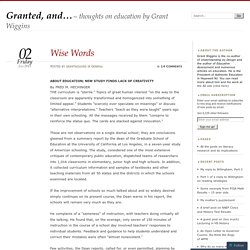
HECHINGER THE curriculum is ”sterile.” Topics of great human interest ”on the way to the classroom are apparently transformed and homogenized into something of limited appeal.” Students ”scarcely ever speculate on meanings” or discuss ”alternative interpretations.” Teachers ”teach as they were taught” years ago in their own schooling. These are not observations on a single dismal school; they are conclusions gleaned from a summary report by the dean of the Graduate School of Education at the University of California at Los Angeles, in a seven-year study of American schooling.
If the improvement of schools so much talked about and so widely desired simply continues on its present course, the Dean warns in his report, the schools will remain very much as they are. He complains of a ”sameness” of instruction, with teachers doing virtually all the talking. Few activities, the Dean reports, called for, or even permitted, planning by students. From a New York Times article. In 1983. Grade levels could be a thing of the past in schools focused on competency.
In a suburb just outside of Denver, Principal Sarah Gould stands outside a fifth-grade classroom at Hodgkins Elementary School watching students work.
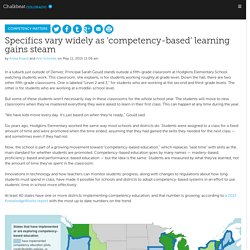
This classroom, she explains, is for students working roughly at grade level. Down the hall, there are two other fifth-grade classrooms. One is labeled “Level 2 and 3,” for students who are working at the second and third-grade levels. The other is for students who are working at a middle-school level. But some of these students won’t necessarily stay in these classrooms for the whole school year. “We have kids move every day. Six years ago, Hodgkins Elementary worked the same way most schools and districts do: Students were assigned to a class for a fixed amount of time and were promoted when the time ended, assuming that they had gained the skills they needed for the next class — and sometimes even if they had not.
But competency-based education doesn’t look the same across the country. Just Start. What do Walt Disney, Steve Jobs, Bill Belichick, and Anshul Samar have in common?
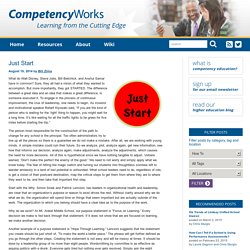
Sure, they all had a vision of what they wanted to accomplish. But more importantly, they got STARTED. The difference between a great idea and an idea that makes a great difference, is someone executed it. To engage in the process of continuous improvement, the crux of leadership, one needs to begin. As investor and motivational speaker Robert Kiyosaki said, “If you are the kind of person who is waiting for the ‘right’ thing to happen, you might wait for a long time. New Classrooms Innovation Partners. MasteryConnect. Learning Happens Anywhere, Anytime. Digital Badges Form Portfolio of Real World Skills Until recently, it's often been difficult to get recognition for skills and achievements gained outside of school.
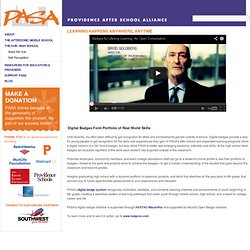
Digital badges provide a way for young people to get recognition for the skills and experiences they gain in PASA's after-school and expanded learning programs (think a digital version of a Girl Scout badge), but also allow PASA to better see emerging passions, interests, and skills. At the high school level, badges act as public signifiers of the skills each student has acquired outside of the classroom. Potential employers, community members, and even college admissions staff can go to a student's online profile to see their portfolio of badges—linked to the work and projects done to achieve the badges—to get a holistic understanding of the student that goes beyond the classroom and beyond grades.
PASA's digital badge initiative is supported through HASTAC/Macarthur and supported by Mozilla Open Badge initiative. The engine behind WGU. Competency Works. Departments - Lindsay Unified School District.
Competency-Based Pathways. You can find recordings and resources here.
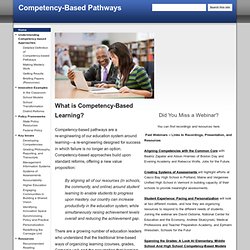
Past Webinars -- Links to Recordings, Presentation, and Resources Aligning Competencies with the Common Core with Beatriz Zapater and Alison Hramiec of Boston Day and Evening Academy and Rebecca Wolfe, Jobs for the Future. Creating Systems of Assessments will highlight efforts at Casco Bay High School in Portland, Maine and Vergennes Unified High School in Vermont in building capacity of their schools to provide meaningful assessments. Student Experience: Pacing and Personalization will look at two different models, and how they are organizing resources to respond to the different needs of students.